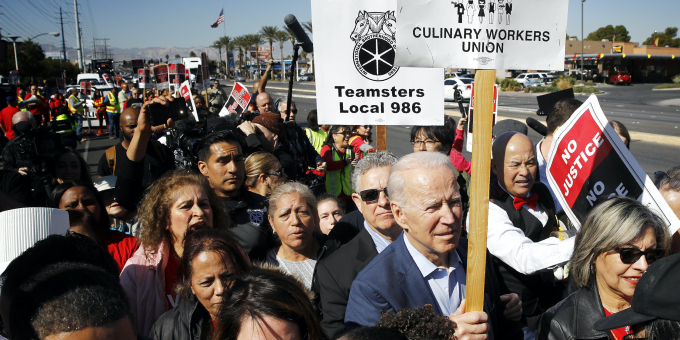The distinction often made by socialists between “liberal parties” and “labour parties” has been undermined somewhat by recent developments on both sides of the Atlantic.
Here in the U.K., much has been of Labour leader Keir Starmer’s decision to sack Sam Tarry, who had been serving as the party’s shadow transport minister. Tarry was accused of joining an RMT picket line and showing his solidarity with striking workers.
On the one hand, this is not surprising as Labour’s links with unions have grown ever more tenuous going back to the emergence of New Labour in the 1990s — and perhaps even earlier. But it was in fact quite shocking — so much so that some union leaders, such as Unite’s Sharon Graham have expressed genuine anger. According the Guardian, Graham “warned that she found it difficult to justify continuing to fund Labour through affiliation fees.”
Starmer has expressed the view that it is not the Labour Party’s job to take sides in strikes. Instead, he argues, Labour is a party of government and it should aim to resolve disputes — not to take sides in them.
The founders of his party, including his namesake Keir Hardie, would not agree. As the TUC reminds us on its website, “Unlike most MPs, Keir [Hardie] usually backed trade union strikes. After all, union members made up most of his voters.”
Things on the other side of the Atlantic are, in theory, entirely different. There is not now and never has been a labour party of any significance in the U.S.
In recent years, unions have tended to throw their weight behind the Democrats, though this was not always the case. The official union position for decades was that labour would reward its friends and punish its enemies. In some cases, that meant endorsing Republicans or, more famously, failing to endorse Democrats. This was the case in 1972, when the AFL-CIO refused to back George McGovern.
But as Democrats have becoming increasingly reliant on union votes (and donations and volunteers), they have increasingly talked like European social democrats. This is nowhere more obvious than in the attitude of leading Democrats toward picket lines.
Bernie Sanders is obviously a regular on union picket lines and has been at this for many years. But of course he’s not a mainstream Democrat — he even calls himself a socialist.
But he’s not alone. The current leader of the Democratic Party is Joe Biden who is definitely not a socialist. But Biden is quite proud of his links to the trade union movement and before being elected President in 2020 made frequent appearances on union picket lines.
In September 2019, he announced that he’d be joining members of the United Auto Workers on a picket in Kansas City. The following month, he publicised a phone call he made to another group of striking workers, offering them encouragement and support. And in December, he tweeted this:
“I won’t be crossing a picket line. We’ve got to stand together with
@UniteHere11 for affordable health care and fair wages. A job is about more than just a paycheck. It’s about dignity.”
I don’t think Joe Biden is to the left of Keir Starmer (though Bernie Sanders might be). But I do think that the two leaders find themselves facing different challenges and have responded differently.
Starmer is clearly terrified of being identified too closely with what the Daily Mail would call trade union “militants”. When people vote in the next general election, Starmer doesn’t want them to think about the 1984 miners’ strike, or the so-called winter of discontent, or even the 1926 general strike. He wants to distance the new, modern Labour Party from all that. He wants to win back votes that went to the Tories, or have been going to the Liberal Democrats.
Of course he’s entirely wrong about this, even from a strictly electoral point of view. The British public understands why people are going on strike and are overwhelmingly supportive of the strikers. Everyone is facing the same cost of living crisis and it would not have hurt Labour to identify itself with those working class people who are fighting to keep their heads above water.
In the USA, the Democrats are struggling win back working class voters who have switched their allegiances in recent years, throwing their support behind right-wing populists like Trump. Trump beat Clinton in 2016 in part because he spoke about genuine issues of concern to working people, like free trade agreements that led to job losses. Clinton was seen as a proponent of a callous globalisation that cared little for workers and their families.
The old distinction between a “labour party”, based on the unions, which defends the interests of workers, and a “liberal party” which does not, may no longer be valid. These days, joining a picket line may be easier for the “liberal” than the “social democrat”. Just ask Sam Tarry.
This article appears in Solidarity today.

Mmmmm…still not convinced…keep tryin’.